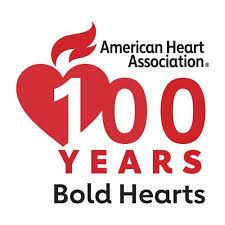- Center on Health Equity & Access
- Clinical
- Health Care Cost
- Health Care Delivery
- Insurance
- Policy
- Technology
- Value-Based Care
American Heart Association to Celebrate 100th Year in Chicago, Where It All Began
Therapies for obesity and inhibitors for lipoprotein(a) (Lp[a]) are among those to be featured at the American Heart Association (AHA) Scientific Sessions November 16-18, 2024, which will take place in Chicago, where the AHA was founded 100 years ago.
If Chicago seems like a chilly place to hold the 2024 American Heart Association (AHA) Scientific Sessions in November, it makes sense once you know that the windy city is the birthplace of the organization, which just turned 100 years old.
AHA 100 years logo | Image credit: Am Heart Assoc

As the AHA gets ready to hold its Scientific Sessions Saturday through Monday at McCormick Place Convention Center, the keys to heart health identified by the founders—good diet and exercise—remain as relevant as ever, if just as difficult for patients to follow.
The AHA was founded June 10, 1924, when 6 pioneering cardiologists met in Chicago to create an organization grounded in the idea that scientific research offered a path to prevention of and treatment for heart disease, which at that time spelled early death. Founder Paul Dudley White, MD, the famed Massachusetts General Hospital physician who helped launch the Framingham Heart Study, said, “We were living in a time of almost unbelievable ignorance about heart disease.”
In the decades prior, the medical community had been focused on infectious disease, and they were winning that battle with the rise of vaccines and antibiotics. But coronary artery disease was taking over as a leading cause of mortality, due to increased smoking and dietary changes after World War I.
Despite significant advances in diagnostics, surgery, therapies, and prevention over the past century—and an overall decline in mortality—recent news in heart health is mixed. This week, the AHA released results from a study being presented this weekend that shows the death rate from ischemic heart disease related to obesity has nearly tripled in the US over the past 20 years; the rate for men has more than tripled.
"Obesity is a serious risk factor for ischemic heart disease, and this risk is going up at an alarming rate along with the increasing prevalence of obesity," lead author Aleenah Mohsin, MD, a postdoctoral fellow at Brown University, said in a statement.
The AHA’s growth to more than 35 million volunteers and supporters, with the annual Scientific Sessions attracting more than 14,000 attendees before the pandemic and 10,000 last year, reflects the organization’s international stature. The AHA Sessions have featured more robust science in recent years, with this year’s lineup of late-breaking trials and featured science highlighting efforts to tackle the modern scourge of obesity and to focus on genetically driven risk factors, notably lipoprotein(a), or Lp(a), a variant containing a protein that elevates risk for atherosclerosis.
Saturday Celebration
After Friday's preconference symposia and early career sessions, the main action begins 8:30 am CT Saturday with the session, “Celebrating a Century of Cardiovascular Science: From Prevention to Treatment, to Cure.” Studies to be presented at that session are:
- BPROAD: the Effects of Intensive Blood Pressure Control on Patients With Type 2 Diabetes, by Guang Ning, MD, PhD, of Shanghai Jiaotong University School of Medicine, Shanghai, China
- SUMMIT: Tirzepatide (Mounjaro) for Patients With Heart Failure With Preserved Ejection Fraction and Obesity, by Milton Packer, MD, who is the Distinguished Scholar in Cardiovascular Science at Baylor University Medical Center at Dallas
- NTLA-2001: Interim Phase 1 Results for Nexiguran Ziclumeran (nex-z), an Investigational In Vivo CRISPR-Based Therapy Under Development for Patients With Transthyretin Amyloidosis With Cardiomyopathy, by Nancy K. Sweitzer, MD, PhD, professor of medicine and vice chair for clinical research, Washington University in St. Louis.
Milton Packer, MD | Image credit: Baylor, Scott, White

Lipid Session. Saturday’s Featured Science Session, “Novel Approaches to Managing Lipid Risk,” which will include 2 sets of results for the third-generation PCSK9 inhibitor lerodalcibep; the phase 3 PALISADE study for plozasiran, an investigational antisense RNA interference therapy that treats dyslipidemia by targeting ApoC3 in the liver; and YELLOW III, which identifies coronary plaque markers that can designate which patients will benefit from evolocumab when added to statin therapy.
Managed Care. Saturday features 10 late-breaking trials across 3 sessions; a highlight of the afternoon session for managed care audiences will be results from PHARM-HF A&F, which is a pharmacist-led trial that makes use of technology to increase heart failure (HF) medication optimization in the Veterans’ Affairs health system. It will be presented by Alexander T. Sandhu, MD, MS, a fellow at Stanford University.
Sunday
FINEARTS-HF, SUMMIT Follow-up on Sunday. Early Sunday, the session, “Getting Closer to the SUMMIT: New HFpEF Treatments” will include an additional abstract on the SUMMIT trial and follow-up results from the FINEARTS-HF study on finerenone (Kerendia), presented in September 2024 at the European Society of Cardiology. The nonsteroidal mineralocorticoid receptor antagonist (MRA) cut the risk of worsening HF events and cardiovascular mortality in patients with HF with mildly reduced or preserved ejection fraction (HFmrEF/HFpEF). Results include:
- The effect of finerenone on a hierarchical composite end point analyzed using win statistics in patients with HFmrEF/HFpEF: a prespecified analysis of FINEARTS-HF
- Efficacy and safety of finerenone in patients with heart failure and mildly reduced or preserved ejection fraction: a prespecified sex-specific analysis of the FINEARTS-HF trial
- Finerenone and risk of hyperkalemia in patients with HFmrEF or HFpEF
- Effects of tirzepatide on cardiorenal end-organ damage in HFpEF: insights from SUMMIT
Late-breaking results. Sunday’s schedule features 7 late-breaking trials, including several with implications for middle- and low-income countries. These include GLORIOUS, which examines the use of a glucagon-like peptide-1 agonist during coronary artery bypass grafting or aortic valve replacement; ENBALV, which studies early use of edoxaban after surgical bioprosthetic valve replacement; TOPSIN, which studies different options for blood pressure control with a single pill in India; NUDGE-FLU, which looked to boost influenza vaccination rates among patients with a history of myocardial infarction; and ZODIAC, a pragmatic trial of a decision support system for physicians prescribing lipid-lowering therapies after acute coronary syndrome.
Monday
Therapeutic Results to Be Featured Monday. Late-breaking results will come early on AHA’s final day, with the ENDEAVOR trial examining mitiperstat, an irreversible inhibitor of myeloperoxidase, in patients with HFpEF/HFmrEF. By targeting myeloperoxidase, this therapy targets inflammation. These results will be presented by Sanjiv J. Shah, MD, Stone Endowed Professor of Medicine, Northwestern University.
The effects of sacubitril/valsartan (Entresto) to prevent cardiotoxicity in patients with elevated risk factors receiving anthracycline chemotherapy is explored in the SARAH trial, which will also be presented Monday. Preventing the cardiac effects of cancer therapies is an important unmet need, especially as more younger adults are diagnosed with cancer. Marcely Gimenes Bonatto, MD, Heart Institute, São Paulo, will present these results.
In a Featured Science session later Monday, 128-week results from VALOR-HCM will report on results for patients treated with mavacamten for obstructive hypertrophic cardiomyopathy (HCM). Caused by a genetic condition, obstructive HCM makes heart muscles thicken and reduces their ability to pump blood. These results will report on patients referred for septal reduction therapy.
Vinay Kini, MD, MSc | Image credit: Weill Cornell Medicine

Policy and Outcomes. Monday’s session, “Behind the Curtain: How Healthcare Policy Shapes Patient Outcomes,” features a series of talks on health care access, equity, health care expenditures, Medicaid work requirements, and health systems structure, including the presentation, “The Association of Cardiologist Vertical Integration With Care Quality, Patient Outcomes, and Utilization,” by Vinay Kini, MD, MSc, of Weill Cornell Medicine.
Lipoprotein(a). Targeting Lp(a) is one of the hottest topics in cardiovascular care, and the conference will conclude with results from KRAKEN, a phase 2 randomized trial evaluating muvalaplin as an Lp(a) inhibitor, and BROOKLYN, evaluating the safety and efficacy of obicetrapib in reducing Lp(a) in patients with heterozygous familial hypercholesterolemia. Obicetrapib is an inhibitor of cholesteryl ester transfer protein (CETP).
Stephen Nicholls, MBBS, PhD, director at Victorian Heart Hospital and Victorian Heart Institute at Monash University, Australia, will present both trials.
The Importance of Examining and Preventing Atrial Fibrillation
August 29th 2023At this year’s American Society for Preventive Cardiology Congress on CVD Prevention, Emelia J. Benjamin, MD, ScM, delivered the Honorary Fellow Award Lecture, “The Imperative to Focus on the Prevention of Atrial Fibrillation,” as the recipient of this year’s Honorary Fellow of the American Society for Preventive Cardiology award.
Listen
Promoting Equity in Public Health: Policy, Investment, and Community Engagement Solutions
June 28th 2022On this episode of Managed Care Cast, we speak with Georges C. Benjamin, MD, executive director of the American Public Health Association, on the core takeaways of his keynote session at AHIP 2022 on public health policy and other solutions to promote equitable health and well-being.
Listen
